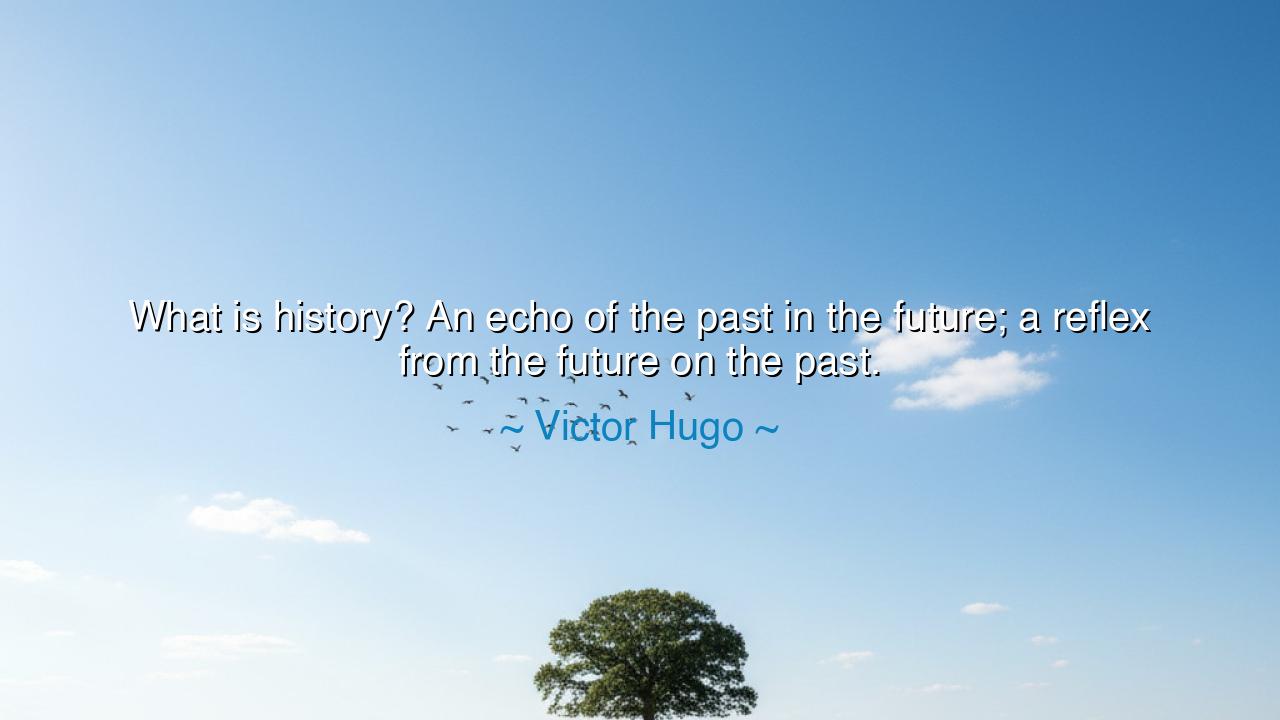
What is history? An echo of the past in the future; a reflex from
What is history? An echo of the past in the future; a reflex from the future on the past.






"What is history? An echo of the past in the future; a reflex from the future on the past." These words from Victor Hugo invite us into a deep reflection on the nature of history—not as a mere sequence of events, but as a living, breathing force that transcends time. To Hugo, history is not just the record of what has been; it is the shadow cast by the future upon the past. It is a mirror that reflects the movements and decisions of the past, while simultaneously guiding and shaping the destiny of the future. The past and future are not distinct realms, but interconnected threads woven into the very fabric of human existence.
The ancients, too, believed that history was more than just a series of events. The Greeks, with their profound sense of fate and destiny, understood that the actions of one generation reverberate through time, shaping the generations that follow. Herodotus, the father of history, chronicled the events of his time, but he also saw the patterns of past civilizations and how they shaped the present. For the Greeks, history was a cycle, ever repeating, as the sins of the past brought about the downfall of empires, and the virtues of one generation led to the rise of others.
Hugo’s notion that history is an echo of the past in the future speaks to this cyclical nature of time. The great empires of the ancient world, like that of Rome, rose and fell, and their lessons were passed down to the generations that followed. In their conquest and their decline, they left behind a legacy of wisdom and warning. History, for Hugo, is not a linear progression, but a spiral, where the echoes of past mistakes or triumphs reverberate forward, influencing the decisions and outcomes of future generations.
Let us look at a real-life example to illuminate this idea. The French Revolution, which Hugo himself would witness, was a reflection of the struggles and injustices of the past. The tyranny of the monarchy, the inequality of the estates, and the suffering of the common people were all shadows of the past that led to the upheaval of the future. Yet, in its aftermath, the revolution also served as a warning to future generations about the dangers of unchecked power and the need for equality and justice. The echo of past tyranny shaped the ideals of freedom and democracy that would echo into the future, altering the course of history.
Moreover, Hugo’s words remind us that the future itself is not merely a distant unknown, but a force that shapes the past. The lessons and values that we carry into the future are influenced by our actions today. The future, like a wise teacher, sends its reflex back to us, urging us to recognize the mistakes of history before they repeat themselves. The world wars, for instance, are reflections of past nationalistic conflicts, but they also gave birth to new movements of peace and cooperation, such as the United Nations, seeking to learn from the past and avoid the same devastation.
The lesson here, then, is profound. History is not just the record of what has been, but the guide to what will be. It is a constant echo, a call to action, urging us to learn from our ancestors and shape the future with wisdom. Each choice we make today sends ripples through time, and we must be mindful of the legacy we are creating. The future is not a distant thing to be awaited, but an active force that shapes our present actions. Just as the past echoes into the future, so too does the future speak back to us, reminding us of the lessons we have yet to learn.
So, let us approach history not as a static collection of events, but as a dynamic force that connects the past, present, and future. Let us learn from the triumphs and mistakes of those who came before us, and let us create a future worthy of the lessons we have inherited. In doing so, we become part of a grand continuum, one where the echoes of the past shape the course of the future, and the future, in turn, guides us toward a more enlightened world.






AAdministratorAdministrator
Welcome, honored guests. Please leave a comment, we will respond soon